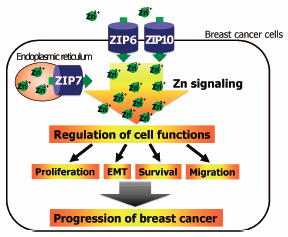Zinc Transporters and the Progression of Breast Cancers (original) (raw)
Abstract
Zinc (Zn) is an essential heavy metal utilized in numerous biological processes in mammals, including its recently described role as a signaling mediator. The movement of Zn in and out of cells, across membranes, is regulated by two protein families: the zinc-regulated transporter (ZRT), iron-regulated transporter (IRT)-like protein (ZIP) and the Zn transporter (ZnT) families. ZIPs and ZnTs maintain intracellular Zn homeostasis and control important cellular functions through Zn signaling. Recent studies have highlighted the role of Zn transporters and Zn in disease. ZIP6, 7, and 10 contribute to human breast cancer progression. ZIP6 is associated with breast tumor grade, size, and stage, suggesting that it is a potent driving force toward malignancy; ZIP7 plays an important role in tamoxifen-resistant breast cancer cells, and ZIP10 is involved in invasion and metastasis of breast cancer cells. These Zn transporters are key molecules in the malignant process; thus, understanding Zn transporters will lead to novel diagnostic and therapeutic strategies for breast cancer. This review discusses the emerging functional roles of Zn and Zn transporters in breast cancer.
